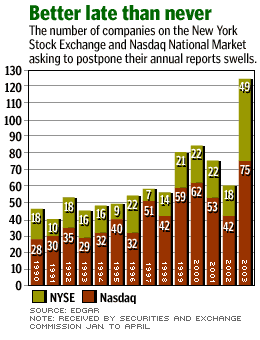NEW YORK (CNN/Money) - If you've ever spent time working in a restaurant kitchen, maybe you've run across the saying "Speed without accuracy is nothing." Follow it, and you won't spend nearly as much time getting chewed out by the chef -- or running over to the first aid kit.
After getting thoroughly told off by regulators and other government types, as well as seeing their share prices get sliced and diced, U.S. companies can relate. So when it came to preparing their 2002 annual reports they were extra careful -- so careful that more than twice as many New York Stock Exchange and Nasdaq National Market-listed companies asked the Securities and Exchange Commission for filing extensions in the January to April period this year as last year.
"There's a whole sea change here," said Harvard Business School accounting professor David Hawkins, who believes the number of late filings signifies a real attitude shift by company managements and their auditors.
Putting in a request to file late is not something that companies do lightly. Although it doesn't get them in any regulatory trouble, it can be death to their stocks. At the very least, it suggests to investors that management doesn't have a very firm handle on what's going on, and it can signal that the auditors have found something truly fishy.

But in the post-Enron, post-WorldCom, post-Tyco, etc. world, the penalties for filing on-time and wrong are severe. Investors view financial legerdemain more harshly than ever before, as does the government. Following the passing of the Sarbanes-Oxley Act last July, chief executives and chief financial officers must sign off on the accuracy of their companies' financial reports. Certifying a false financial report could put you in jail for as many as 20 years and land you a fine of up to $5 million.
Auditors, too, have been thumbing through company books more intently. The demise of Andersen was a hard lesson, and they're trying to restore respect to their profession.
"No question, they're being tougher, more comprehensive in their audits," Hawkins said. "They're actually auditing transactions, rather than just auditing by interview. They're less tolerant of weaknesses in internal control systems, and not as ready to accept management explanations."
As a result, Hawkins said, the audits for 2002 are probably the best the country has seen in over two decades. In the long run, this is a very good thing because it gives investors back some degree of trust in the accuracy of company results. The less worried you are about getting shocked by an accounting scandal, the more confident you can be in your investing. All things being equal, that makes for higher stock prices.
"It's something of an uplifting experience for us in the investing community to see that companies really are taking their accounting seriously," State Street chief investment strategist Ned Riley said. "An exercise that CEOs seemed to treat as rote and automatic is viewed totally differently."
But there also is something of a downside to the extra care that Corporate America is putting into doing its books. When a CEO takes more of an active role in running the numbers for various divisions, he is more likely to spot areas that he'd like to cut like expensive projects and badly performing divisions. Making such cuts may make the company more efficient, but it also could mean less money in the hands of the company's suppliers and more people out of work. Long-term, maybe that makes the economy more efficient. Short-term, it hurts.
More seriously, thinks Merrill Lynch chief North American economist David Rosenberg, bookkeeping worries may be prompting company heads to be far more conservative than they'd otherwise be. So even perfectly reasonable projects get put on hold, and capital spending continues to suffer.
"If CEOs are just frozen in fear," Rosenberg said, "who's going to go on a spending spree."

|

